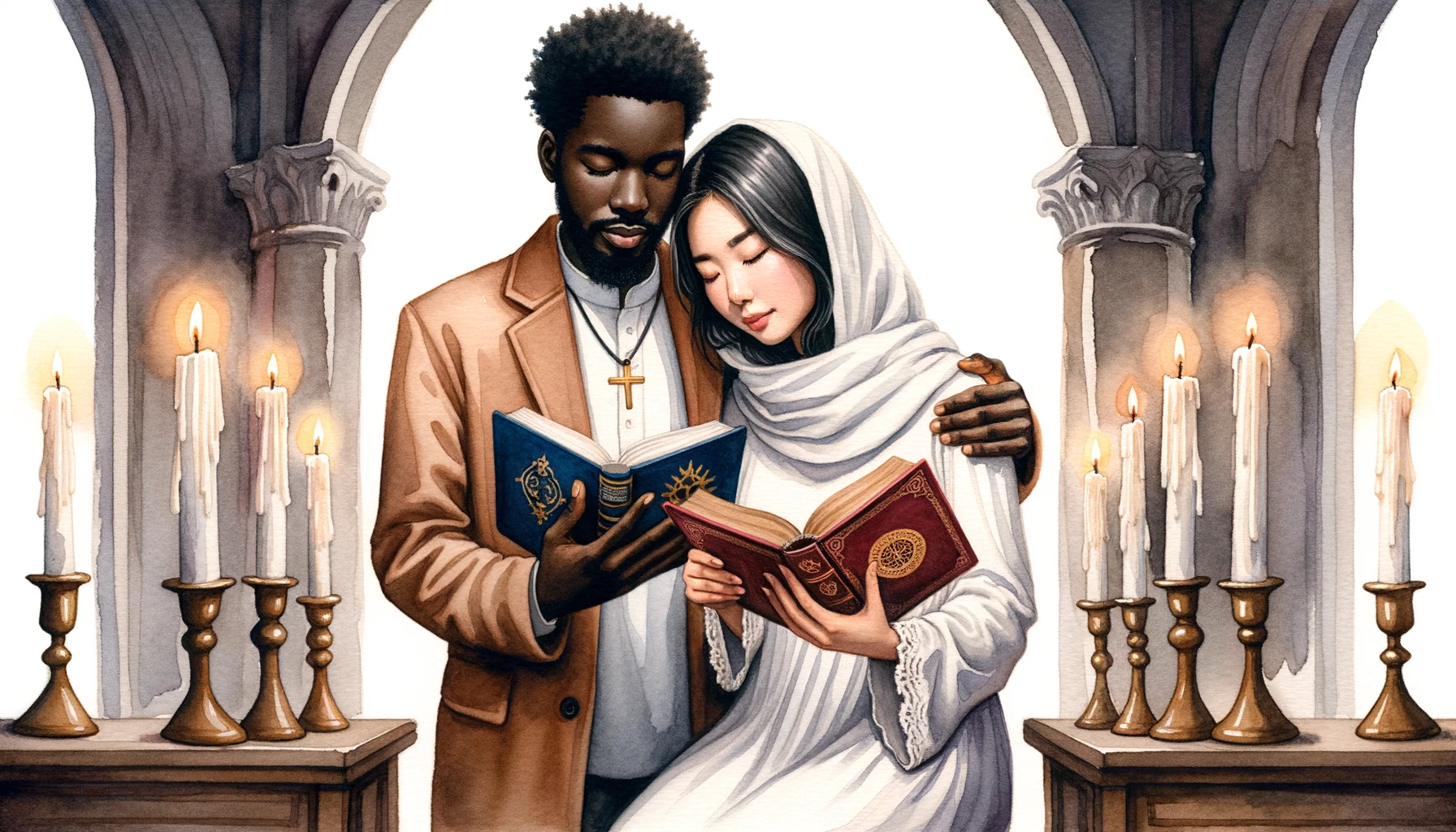Dating and marriage can be both exciting and challenging, particularly for Christians who strive to follow God’s will in their relationships. But is it right for a Christian to date or marry a non-Christian? In this article, we’ll explore what the Bible has to say on this topic, aiming to provide a comprehensive guide for those seeking answers. Let’s dive into the Scriptures and consider the implications for Christian relationships.
Understanding the Concept of Being “Unequally Yoked”
One key biblical principle that Christians often refer to when discussing relationships with non-Christians is the concept of being “unequally yoked.” This term comes from 2 Corinthians 6:14, where the Apostle Paul writes, “Do not be yoked together with unbelievers. For what do righteousness and wickedness have in common? Or what fellowship can light have with darkness?”
To fully understand this concept, we need to first look at its origins. The term “yoked” refers to a wooden crosspiece that was used to join two animals, typically oxen, so they could work together to pull a plow or cart. If the animals were unequal in strength or size, the yoke would cause strain on both animals, and their efforts would be less effective. In the same way, Paul is using this metaphor to highlight the potential difficulties that can arise in a relationship between a believer and an unbeliever.
The Bible teaches that Christians are called to live a life devoted to God, following the teachings of Jesus Christ and striving to grow in their faith. A Christian’s ultimate goal is to bring glory to God and live a life that is pleasing to Him. In contrast, a non-Christian may not share these same values and priorities, which could lead to conflicts and challenges within the relationship.
In addition to the verse in 2 Corinthians, there are other passages in the Bible that highlight the importance of believers forming relationships with those who share their faith. For example, in Deuteronomy 7:3-4, the Israelites were instructed not to intermarry with the people of other nations: “Do not intermarry with them. Do not give your daughters to their sons or take their daughters for your sons, for they will turn your children away from following me to serve other gods, and the Lord’s anger will burn against you and will quickly destroy you.”
Though this passage specifically addresses the Israelites, the underlying principle is still relevant for Christians today. By forming close relationships with those who do not share their faith, Christians may face challenges in maintaining their commitment to God and living out their beliefs.
The concept of being “unequally yoked” serves as a reminder for Christians to consider the potential challenges and implications of entering into a relationship with a non-Christian. The Bible encourages believers to form relationships with those who share their faith, as this can provide a strong foundation for growth in their spiritual lives and help them remain focused on their commitment to God.
Biblical Examples and Lessons on Interfaith Relationships
There are several biblical examples that illustrate the potential consequences of interfaith relationships, as well as stories that demonstrate how God can work through these unions to accomplish His purposes. These examples can provide valuable lessons and insights for Christians considering a relationship with a non-Christian.
Solomon and his foreign wives: King Solomon, renowned for his wisdom, is a cautionary example of how interfaith relationships can lead to spiritual downfall. Despite his wisdom, Solomon married many foreign women who worshiped other gods. 1 Kings 11:4 states, “As Solomon grew old, his wives turned his heart after other gods, and his heart was not fully devoted to the Lord his God, as the heart of David his father had been.” Consequently, Solomon’s relationships with these women led him away from God, and his kingdom was eventually divided.
Ruth and Boaz: In contrast, the story of Ruth and Boaz demonstrates how God can use an interfaith relationship for His glory. Ruth was a Moabite woman who married an Israelite man named Mahlon. After Mahlon’s death, Ruth chose to follow her mother-in-law, Naomi, back to Israel, adopting the Israelite faith and customs. Ruth eventually married Boaz, an Israelite man who was a relative of Naomi’s. Through their union, Ruth became part of the lineage of Jesus Christ (Matthew 1:5). Ruth’s conversion and commitment to the Israelite faith made it possible for God to work through her life in a powerful way.
Joseph and Asenath: Another example is the story of Joseph, the son of Jacob, who married Asenath, an Egyptian woman. Joseph was sold into slavery in Egypt, where he eventually rose to a position of power as a trusted adviser to Pharaoh. When famine struck the land, Joseph was placed in charge of distributing food to the people. In Genesis 41:45, we learn that Pharaoh gave Joseph an Egyptian wife named Asenath. Though Asenath’s religious background is not explicitly mentioned, it is likely that she was initially a worshiper of Egyptian gods. However, as Joseph maintained his faith in the God of Israel, it is possible that Asenath may have come to share his faith. This union did not lead Joseph away from his faith, and he continued to serve God faithfully.
These biblical examples highlight the potential risks and rewards of interfaith relationships. Christians should be mindful of the potential dangers, as seen in Solomon’s story, while also acknowledging that God can work through these relationships, as demonstrated by Ruth and Boaz, and Joseph and Asenath. However, it is crucial for Christians to remember that maintaining a strong, unwavering faith is essential if they choose to enter into a relationship with a non-Christian.
Practical Considerations for Christians in a Relationship with a Non-Christian
While the Bible provides guidance on the potential challenges of being unequally yoked and offers examples of interfaith relationships, it is also essential for Christians to consider practical aspects of dating or marrying a non-Christian. Here are some important factors to keep in mind:
Spiritual growth and support: One of the primary functions of a Christian marriage is to encourage and support each other’s spiritual growth. Ephesians 5:25 states, “Husbands, love your wives, just as Christ loved the church and gave himself up for her.” This verse highlights the self-sacrificing love that should be present in a Christian marriage, which includes supporting each other’s spiritual journey. In a relationship with a non-Christian, this mutual spiritual support may be lacking, potentially hindering one’s growth in faith.
Moral and ethical values: Christians are called to live according to the moral and ethical teachings of the Bible. These values may differ significantly from those held by a non-Christian partner. Disagreements over moral and ethical issues can lead to tension and conflict within the relationship. For example, decisions about how to raise children, financial management, and even day-to-day interactions may be influenced by differing beliefs and values.
Participation in religious activities: A crucial part of a Christian’s life is participating in religious activities such as attending church, engaging in Bible study, and praying. In a relationship with a non-Christian, these activities may not be shared, which can create feelings of isolation or resentment. Additionally, a non-Christian partner may not understand or support the importance of these activities, making it more difficult for the Christian to remain committed to their faith.
Potential for conversion: While it is possible that a non-Christian partner may eventually convert to Christianity, it is important for Christians not to enter a relationship with the primary goal of converting their partner. 1 Corinthians 7:16 states, “How do you know, wife, whether you will save your husband? Or, how do you know, husband, whether you will save your wife?” This verse serves as a reminder that it is ultimately God who works in a person’s heart to bring them to faith, and Christians should not view their relationships as a means of “saving” someone.
Christians considering a relationship with a non-Christian should carefully weigh the potential challenges and implications for their faith. The Bible’s teachings on being unequally yoked, along with biblical examples of interfaith relationships, provide valuable guidance for believers. Practical considerations such as spiritual growth, moral and ethical values, participation in religious activities, and the potential for conversion should be taken into account. Christians should prayerfully seek God’s guidance in their relationships, trusting in His wisdom and direction.
Final Thoughts on Christian Relationships and Faith
As we’ve explored the issue of Christians dating or marrying non-Christians, it’s clear that there are potential challenges and implications for one’s faith. The Bible provides guidance, examples, and practical considerations for those navigating this complex topic. As you reflect on your own relationships, consider these questions:
- How important is it for me to share my faith with my partner, and how will this impact our relationship?
- What potential challenges might I face in a relationship with a non-Christian, and how can I remain strong in my faith despite these challenges?
- How can I prayerfully seek God’s guidance and wisdom in my relationships and decisions about dating or marrying a non-Christian?
Remember that your relationship with God is paramount, and He desires the best for you. Trust in His guidance and wisdom as you navigate the world of dating and marriage, keeping your faith at the forefront of your decisions. As Proverbs 3:5-6 states, “Trust in the Lord with all your heart and lean not on your own understanding; in all your ways submit to him, and he will make your paths straight.” With God’s guidance, you can make wise choices in your relationships that will ultimately honor Him and strengthen your faith.














